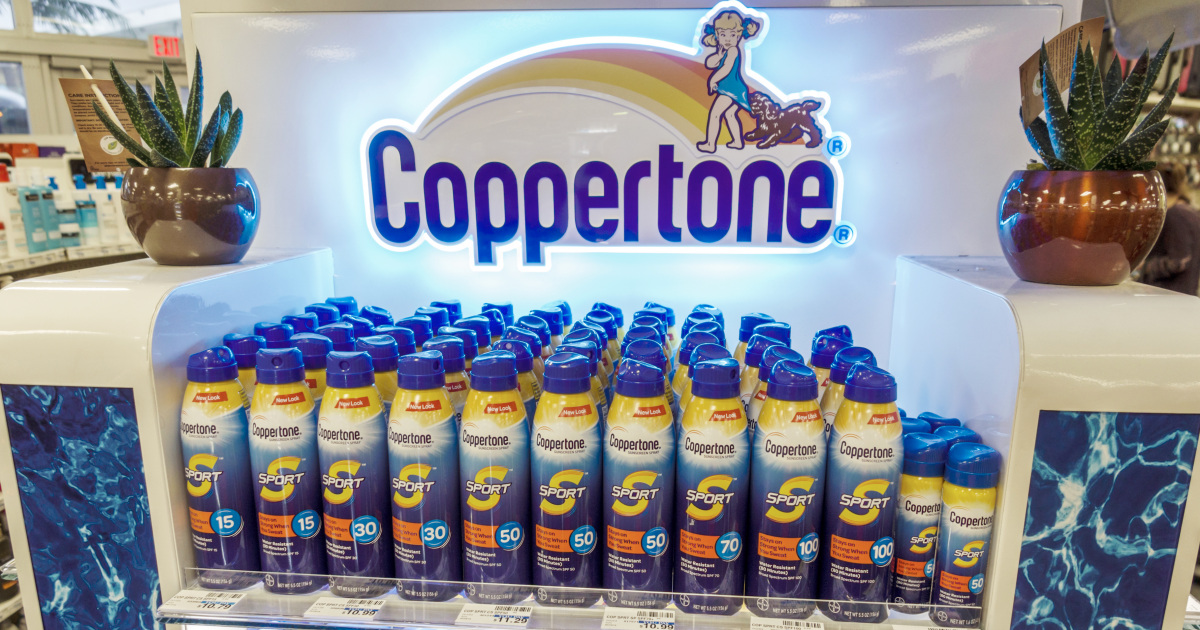Coppertone issued a sunscreen recall for five of its products after discovering the presence of the cancer-causing chemical benzene.
The nationwide recall applies to five aerosol SPF 50 products manufactured between January 10 and June 15 of this year: Pure & Simple, Pure & Simple Baby, Pure and Simple Kids, Sport Mineral, and Travel-Size Sport.
Read MoreBenzene was also detected in sunscreens from Sun Bum, CVS Health, Goodsense, Fruit of the Earth, EltaMD and Raw Elements, according to a report submitted by the testing lab Vasilure to the Food and Drug Administration in May.
“The presence of this known human carcinogen in sunscreen products widely recommended for the prevention of skin cancer and regularly used by adults and children in large volumes make this finding especially troubling,” read the letter to the FDA.
Studies have linked heightened levels of benzene to leukemia and other hematologic cancers. The carcinogen can be absorbed through the skin in liquid form, ingested, or inhaled as its vapor lingers in the air.
What Should Coppertone Consumers Do?
Consumers should stop using these specific Coppertone aerosol sunscreen spray products and dispose of them appropriately. Consumers can contact 1-888-921-1537 with questions Monday to Friday. Consumers may also access www.sunscreenrecall2021.com to request a product refund and for additional information.
Coppertone is also notifying its retailers and is arranging for returns of all recalled lots of sunscreen spray products. Consumers should contact their physician or healthcare provider if they have experienced any problems related to using these aerosol sunscreen spray products.
Adverse reactions or quality problems experienced with this product may be reported to the FDA’s MedWatch Adverse Event Reporting program online, by regular mail, or by fax. Reporting forms can be obtained by calling 1- 800-332-1088.
Choose the Right Sunscreen
Benzene Exposure Linked to Hematologic Cancers
Multiple studies dating back to 1897 have found individuals exposed to high levels of benzene – particularly employees at chemical plants and oil refineries – were far more likely to be diagnosed with leukemia.
Similar studies also determined that these individuals had an increased risk of being diagnosed with other forms of hematologic cancers, such as multiple myeloma and non-Hodgkin lymphoma.
Benzene is a liquid chemical most often used as a solvent in chemical and pharmaceutical products. It is also a natural byproduct found in gasoline emissions, secondhand cigarette smoke, and forest fires.
Most people are exposed to low levels of benzene through the air, inhaling the chemical as it slowly evaporates in the air. That is why cigarette smokers have benzene levels that are higher than the general public.
Despite these known risks, benzene is among the top 20 chemicals used in the US based on production volume.
Signs & Symptoms of Benzene Exposure
People who breathe in high levels of benzene may develop the following signs and symptoms within minutes to several hours:
- Dizziness
- Drowsiness
- Rapid or irregular heartbeat
- Headaches
- Tremors
- Confusion
- Unconsciousness
- Death (at very high levels)
Eating foods or drinking beverages containing high levels of benzene can cause the following symptoms within minutes to several hours:
- Vomiting
- Irritation of the stomach
- Dizziness
- Sleepiness
- Convulsions
- Rapid or irregular heartbeat
- Death (at very high levels)
Do Benzene and Formaldehyde Cause Acute Myeloid Leukemia?
Learn more about SurvivorNet's rigorous medical review process.


